Health screenings you need in your 60s
Both men and women should get these tests. Have you had them yet?
Updated on September 26, 2022

As s you approach your retirement years, your health needs and concerns may be different from what they were in your 40s and 50s.
“Even if you feel fine, you should be screened regularly for a bevy of health issues that you might not have thought about when you were younger,” says Sandra Fryhofer, MD, an internist based in Atlanta and spokesperson for the American College of Physicians. Here are the key tests you’ll need to help ensure well-being and prevent disease as you get into your 60s and beyond.
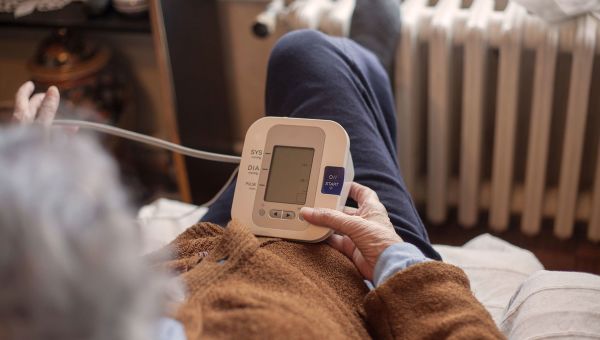
Blood Pressure Screenings
According to the Centers for Disease Control and Prevention (CDC), nearly half of American adults have hypertension, or high blood pressure, which puts them at increased risk of heart disease and stroke. “It’s a silent killer, especially among people over the age of 60,” says Dr. Fryhofer.
That's why the United States Preventive Services Task Force (USPSTF) recommends yearly blood pressure screenings once you hit age 40. It’s also a good idea to periodically check your blood pressure whenever you’re at your local pharmacy to make sure it’s not creeping up on you, says Fryhofer. Keeping track of your blood pressure can make you aware of changes over time as well. Try maintaining a written record or using an app, like Sharecare (available for iOS and Android).
To note: The American Heart Association (AHA) currently defines hypertension as a systolic (top number) reading of at least 130 mm Hg or a diastolic (bottom number) reading of at least 80 mm Hg. If you have elevated blood pressure, your healthcare provider (HCP) will recommend steps to prevent hypertension. These might be a combination of lifestyle changes and medication, depending on the severity of your condition and your risk of stroke.

Cholesterol Tests
A complete cholesterol test—also called a lipid panel—measures the amount of cholesterol and triglycerides in your blood. This test helps determine your risk of plaque buildup in your arteries, which can raise your risk of heart disease and stroke. If you have high cholesterol, your risk of heart disease is significantly higher.
The AHA recommends getting your cholesterol checked every four to six years starting at age 20, even if you’re otherwise healthy. If yours is elevated, or if you have other health conditions such as diabetes, you may need to be checked more often, says Fryhofer.
According to the CDC, your total cholesterol should ideally be less than 200 mg/dL (optimally about 150 mg/DL), your LDL (aka “bad” cholesterol) should be at or under 100 mg/dL, and your HDL (“good” cholesterol) should be higher than or equal to 40 mg/dL if you are a man and 50 mg/dL if you are a woman. Your triglycerides should be less than 150 mg/dL. Your HCP will interpret your levels in the context of your overall heart risk.
The good news: Contrary to popular belief, you don’t have to fast for a cholesterol test, says Michael Hochman, MD, MPH, director of the Gehr Family Center for Health Systems Science at the Keck School of Medicine of the University of Southern California.
“I’ve had older patients practically pass out on me in the office when they come in because they’ve been fasting, but research shows that non-fasting results typically differ from fasting results by only a couple of points,” Dr. Hochman says. If your results are elevated or borderline, your HCP may just have you repeat the test a few weeks later when you are fasting.

Diabetes Screenings
As many as 15.9 million Americans over the age of 65 have diabetes—a whopping 29.2 percent, according to the American Diabetes Association (ADA). And of the 37.3 million with diabetes in the U.S., 8.5 million of those are undiagnosed.
The USPSTF has accordingly recommended that people between the ages of 35 and 70 who have no symptoms but are overweight or obese get screened for prediabetes and type 2 diabetes. The ADA is a bit more expansive and recommends that all people be screened for prediabetes and diabetes starting at age 35.
Most of the time, if someone doesn’t have any risk factors for diabetes and they are in their 60s, screening them every three years for the disease is fine, says Hochman. But if you have risk factors such as being overweight, having high blood pressure, or having a first-degree relative (a parent or sibling) with type 2 diabetes, you may be screened more frequently.
Tests that may be used to screen for type 2 diabetes may include a fasting blood glucose or an A1C test. The benefit of the A1C test is that it allows your HCP to get a picture of your blood sugar levels over the previous three months. It’s also often the easiest one to do, since it’s a simple blood test that doesn’t involve fasting, says Hochman.
According to AHA guidelines, a normal systolic (upper number) reading should come in under 120 mm Hg and a healthy diastolic (bottom number) reading should be lower than 80 mm Hg.

Colon Cancer Screenings
According to the American Cancer Society (ACS), the fourth most common cancer found in Americans is colorectal cancer, which is cancer in the colon, rectum, or both. The good news is, over the last several decades, death rates have been dropping, thanks in part to better screening methods.
The ACS suggests those at average risk for colon cancer begin screenings at age 45. Based on your preference, this may involve:
- An annual fecal occult blood test or fecal immunochemical (FIT) test
- A stool DNA test (called Cologuard) every one to three years
- Computed tomographic colonography (CTC) every five years
- Flexible sigmoidoscopy every 5 years
- Flexible sigmoidoscopy every 10 years if you do an annual FIT
- Colonoscopy every 10 years
The advantage to a colonoscopy is its sensitivity and the ability to remove lesions while the procedure is happening. Additionally, if nothing suspicious is found, you likely won’t have to worry about screening again for a decade, says Hochman. The downside is the unpleasant prep—you have to drink laxatives before the procedure to clean out your colon—as well as a very slight risk of serious complications, such as perforation of your colon or excessive bleeding.
According to the ACS, if you choose a screening method other than a colonoscopy and receive an abnormal result, you should then follow up with a colonoscopy as soon as possible.
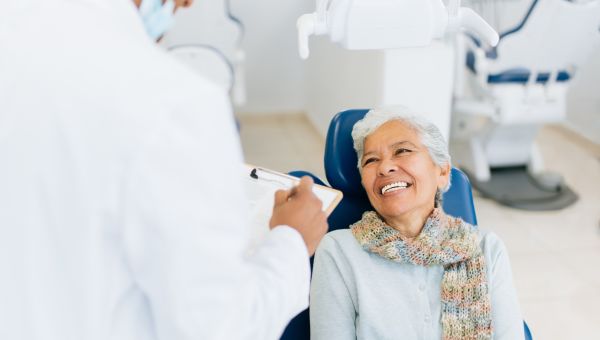
Dental Exams
One hundred million Americans fail to see a dentist each year, according to the American Dental Association (ADA), even though the organization recommends you visit your dentist for a dental exam and cleaning regularly.
The National Institute of Dental and Craniofacial Research (NIDCR) has reported that about 42 percent of Americans ages 30 and up have periodontal (gum) disease. To help reduce your overall risk, it’s important to brush twice each day and floss your teeth daily, get regular cleanings, and follow recommendations from your HCP (such as eating a healthy diet and quitting tobacco).
There’s no one-size-fits-all approach for going to the dentist. In your 60s, if your teeth are in good health, you may only require regular visits. Alternatively, if you have developed gum disease, you may need more frequent visits. You don’t always need annual dental X-rays. If you haven’t had a cavity in a few years and you’re not at high risk for them, the ADA recommends that you and your dentist discuss your need for X-rays and settle on a timetable that makes sense for you.

Vision Exams
The CDC estimates that more than 4.2 million Americans over the age of 40 are either legally blind or have low vision (less than 20/40 in the better-seeing eye). The top causes of vision loss in the U.S. are age-related eye diseases such as macular degeneration, cataracts, and glaucoma. Other common eye disorders include amblyopia, strabismus, and diabetic retinopathy. The leading cause of blindness in people over age 65 is age-related macular degeneration (AMD).
Even if you don't have symptoms or risk factors for vision conditions, the American Academy of Ophthalmology (AAO) recommends that you see an eye provider for a complete exam every one to two years if you’re 65 or older.

Screenings for Smokers
If you have a history of smoking, you should speak to your HCP about lung cancer screening. According to the USPSTF, you should be screened for lung cancer if you are between the ages of 50 and 80 and have a 20-pack-year smoking history and either currently smoke or have quit within the last 15 years. (A “pack-year” refers to the number of packs smoked per day multiplied by the number of years you’ve smoked. So, if you smoke three packs per day for 10 years, it’s 30 pack-years.)
If you have not smoked within the last 15 years or if you develop a health condition that limits your life expectancy and/or your willingness or ability to have surgery to cure lung cancer, screening is no longer necessary.
The USPSTF also recommends a one-time screening for abdominal aortic aneurysm (AAA) with ultrasonography in men ages 65 to 75 years who smoke or have smoked. This condition is an enlargement of the aorta, the main blood vessel that delivers blood to your body. It's rare, but more common in older male smokers. If the aorta bursts, it can be fatal.

Women's Screenings
Certain tests are recommended if you are a woman as you advance in age.
The ACS suggests that average-risk women be given the option to start having annual mammograms at age 40. The American College of Obstetricians and Gynecologists (ACOG) recommends getting a mammogram every one to two years starting at age 40. Both organizations advise women to become familiar with the feel of their own breasts so they’re better able to recognize changes. ACOG recommends a clinical breast exam as well.
“I usually tell my female patients to aim for mammograms every year. The reality is that women are busy, and more often than not it ends up getting pushed off so it’s every 15 or 18 months or so, anyway,” says Fryhofer. “But if you tell someone every two years, she might end up stretching it to every three years, which isn't recommended.”
If you have a family history of breast cancer, or other risk factors for the disease, talk to your HCP about whether it makes sense to have more frequent screenings or an MRI screening to supplement your mammography. According to the ACS, you should continue screening for breast cancer as long as you are in good health and expect to live at least another 10 years.
Beyond breast cancer screenings, most women still need to be screened for cervical cancer until they turn 65. Options include:
- A Pap test every three years
- An HPV test every 5 years
- A combination of Pap and an HPV test every five years. (HPV is the virus that causes cervical cancer.)
You can stop after age 65 if you don’t have a history of cervical cancer, if you've had regular screenings, and if you're not at increased risk.

Osteoporosis Screenings
All women should be screened for osteoporosis starting at age 65 with a bone density test (DEXA scan), according to the USPSTF. The condition occurs when your body loses too much bone, increasing risk for fracture. You may need to be screened earlier if you have risk factors—like smoking or diabetes—or if you're on medications that can cause bone loss, such as the steroid prednisone.
If your results are normal, you won’t need a repeat scan for 10 to 15 years, but if your scan shows mild bone loss (osteopenia) you’ll need a follow up scan in 3 to 5 years. For more serious bone loss, you may be screened every two years.
According to the USPSTF, if you are a man in your 60s, osteoporosis screening isn’t recommended unless there's evidence they've lost bone mass already or they have risk factors, including hyperthyroidism and certain intestinal problems. In these cases, men should talk to their HCP about screening, says Fryhofer.

Prostate Cancer
For men, when to screen for prostate cancer is controversial. "It has a high rate of false positives,” says Hochman, “which can lead to unnecessary worry and treatments that may be more harmful than the disease.”
For this reason, recommendations vary among organizations, and much ultimately depends on a patient’s preference.
Prostate screening is no longer routinely recommended for men who have no symptoms. While some experts suggest starting around age 40, the U.S. National Library of Medicine notes that for men younger than 55, screening for prostate cancer is usually not recommended unless you are at higher risk, including having a close family history (such as a sibling or parent) or being African American.
That said, groups like the USPSTF and the American Urological Association (AUA) recommend that the screening decision should be an individual one and suggest all men between the ages of 55 and 69 have a discussion about the pros and cons of the test with their HCP. If you get screened, you will receive a PSA blood test, which measures a specific protein made by the prostate gland.
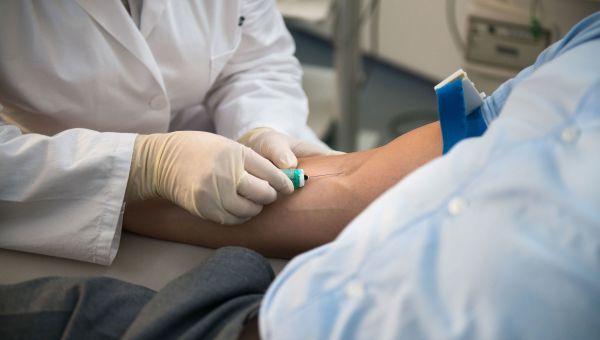
Testing for Sexually Transmitted Infections
Many older adults don’t even think about it, but if you’re not in a monogamous relationship or you have multiple sexual partners, you should be screened for HIV just like a younger person with risk factors, advises Hochman. Regardless, it’s recommended that all people over the age of 60 have a one-time HIV test if they haven't been previously tested. Women with risk factors for sexually transmitted infections should also be tested for chlamydia and gonorrhea.
Anyone born between 1945 and 1965 should also have a one-time hepatitis C screening, as they are five times more likely to have the condition than other adults. While hep C can be transmitted sexually, the reason for this screening is related to something else entirely: Baby boomers may have become infected from medical equipment or procedures before universal precautions against the virus were put into effect.
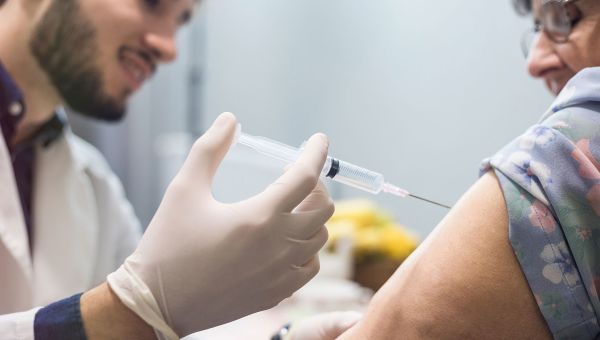
Vaccines
Vaccines are crucial for people over the age of 60 because as you get older, your immune system weakens and it’s harder to fight off infections. These include the following.
An annual flu vaccine: Over 60 percent of seasonal flu-related hospitalizations occur in people 65 years and older, according to the CDC.
Pneumococcal vaccine: It’s recommended for all adults age 65 and older and those younger with certain health conditions such as diabetes. Two vaccines protect against pneumococcal disease: PCV13 (Prevnar 13) and PPSV23 (Pneumovax 23). The CDC recommends that all adults 65 and older have both shots, at least a year apart, with the PCV13 first.
Shingles vaccine: Almost 1 in 3 people in the U.S. will develop shingles during their lifetime, and your risk increases as you age. Shingles is a painful reactivation of the chickenpox virus in your body. A new shingles vaccine, Shingrix, was approved by the FDA in 2017. The CDC recommends anyone over age 50 get this immunization, which requires two doses a few months apart. It’s 97 percent effective for adults in their 50s and 60s who are not immunocompromised.
Tetanus, diphtheria, and pertussis (Tdap) vaccine: If you've never received a Tdap vaccination—or you're not sure—you should receive a series of tetanus and diphtheria (Td) vaccines. If you did have a Tdap, you still need a Td booster every 10 years.
COVID vaccine: Speak to your HCP about the latest recommendations for getting the COVID shot. If you’ve previously received the vaccine, it may be time for your booster. If you haven’t yet received a first dose, get yours now: The COVID vaccine can greatly reduce the risk of serious complications from COVID.

American Academy of Ophthalmology. Eye Exam and Vision Testing Basics. Page last reviewed March 8, 2022.
American Cancer Society. American Cancer Society Guideline for Colorectal Cancer Screening. Page last updated Nov. 17, 2020.
American Cancer Society. The American Cancer Society Guidelines for the Prevention and Early Detection of Cervical Cancer. Page last updated April 22, 2021.
American Cancer Society. American Cancer Society Recommendations for the Early Detection of Breast Cancer. Page last updated Jan. 14, 2022.
American Cancer Society. Cancer Statistics Center. Estimated new cases by cancer type. Accessed September 26, 2022.
American Cancer Society. Key Statistics for Colorectal Cancer. Page last reviewed Jan. 12, 2022.
American College of Cardiology. USPSTF Recommendations for Screening for HTN in Adults. April 29, 2021.
The American College of Obstetrics and Gynecologists. Mammography and Other Screening Tests for Breast Problems. Last reviewed November 2020.
The American College of Obstetrics and Gynecologists. Cervical Cancer Screening. Page last reviewed May 2021.
American Dental Association. Home Oral Care. Page last updated July 22, 2020.
American Dental Association. X-Rays/Radiographs. Page last updated Dec. 22, 2021.
American Diabetes Association. Latest ADA Annual Standards of Care Includes Changes to Diabetes Screening, First-Line Therapy, Pregnancy, and Technology. December 20, 2021.
American Diabetes Association. Statistics About Diabetes. Page last updated Juy 28, 2022.
American Heart Association. Diabetes Risk Factors. Last reviewed May 5, 2021.
American Heart Association. High Blood Pressure. Accessed September 26, 2022.
American Heart Association. How to Get Your Cholesterol Tested. Page last reviewed Nov. 9, 2020.
American Urological Association. Early Detection of Prostate Cancer. 2018.
BrightFocus Foundation. Age-Related Macular Degeneration: Facts & Figures. July 13, 2021.
Centers for Disease Control and Prevention. Alzheimer’s Disease and Healthy Aging. COVID-19 Risks and Vaccine Information for Older Adults. Last reviewed August 24, 2021.
Centers for Disease Control and Prevention. Common Eye Disorders and Diseases. Page last reviewed June 3, 2020.
Centers for Disease Control and Prevention. Diabetes Tests. Last reviewed August 10, 2021.
Centers for Disease Control and Prevention. Facts About Hypertension. Page last reviewed July 12, 2022.
Centers for Disease Control and Prevention. Getting Your Cholesterol Checked. Page last reviewed July 12, 2022.
Centers for Disease Control and Prevention. High Cholesterol Facts. Page last reviewed July 12, 2022.
Centers for Disease Control and Prevention. Pneumococcal Vaccine Timing for Adults. Last reviewed April 4, 2022.
Centers for Disease Control and Prevention. Shingles Vaccination. Page last reviewed May 24, 2022.
Centers for Disease Control and Prevention. What Vaccines are Recommended for You. Page last reviewed March 30, 2022.
GSK.com. Shingrix approved in the US for prevention of shingles in immunocompromised adults. July 26, 2021.
Health and Human Services. Immunization: Adults Age 65 and Older. Last reviewed April 29, 2021.
HIVInfo.gov (NIH). HIV and Older People. Last reviewed August 23, 2021.
Johns Hopkins Medicine. Lipid Panel. Accessed September 26, 2022.
Johns Hopkins Medicine. Osteoporosis: What You Need to Know as You Age. Accessed September 26, 2022.
MedlinePlus. Health screenings for men ages 40 to 64. Review date April 19, 2020.
Mouth Healthy. American Dental Association. Oral Health. Accessed September 26, 2022.
National Institute of Aging. Taking Care of Your Teeth and Mouth. Page last reviewed March 13, 2020.
National Institute of Dental and Craniofacial Research. Periodontal Disease in Adults (Age 30 or Older). Page last reviewed August, 2021.
UpToDate. Patient Education: Bone Density Testing (Beyond the Basics). Page last reviewed July 2022.
University of Iowa Hospitals & Clinics. Ask an expert: Why should baby boomers get tested for hepatitis C? Page last reviewed September 2017.
U.S. National Library of Medicine. Health Screenings for Men Ages 40 to 64. U.S. Preventative Services Task Force. Abdominal Aortic Aneurysm: Screening. Page last reviewed Dec. 10, 2019. U.S. Preventative Services Task Force. Breast Cancer: Screening. Page last reviewed Jan. 11, 2016.
U.S. Preventative Services Task Force. Chlamydia and Gonorrhea: Screening. September 14, 2021.
U.S. Preventative Services Task Force. Colorectal Cancer: Screening. Page last reviewed May 18, 2021.
U.S. Preventative Services Task Force. Hypertension in Adults: Screening. Page last reviewed April 27, 2021.
U.S. Preventative Services Task Force. Impaired Visual Acuity in Older Adults: Screening. Page last reviewed May 24, 2022.
U.S. Preventative Services Task Force. Lung Cancer: Screening. Page last reviewed March 9, 2021.
U.S. Preventative Services Task Force. Osteoporosis to Prevent Fractures: Screening. Page last reviewed June 26, 2018.
U.S. Preventative Services Task Force. Prediabetes and Type 2 Diabetes: Screening. Page last reviewed Aug. 24, 2021.
U.S. Preventative Services Task Force. Prostate Cancer: Screening. Page last reviewed May 18, 2018.
More On


video
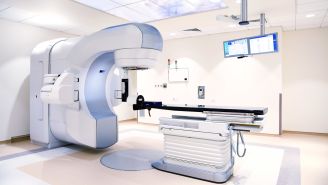
article


video


video


video
